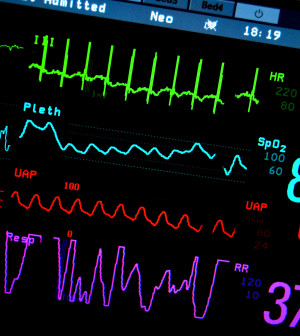- Could Artificial Sweeteners Be Aging the Brain Faster?
- Techniques for Soothing Your Nervous System
- Does the Water in Your House Smell Funny? Here’s Why
- Can a Daily Dose of Apple Cider Vinegar Actually Aid Weight Loss?
- 6 Health Beverages That Can Actually Spike Your Blood Sugar
- Treatment Options for Social Anxiety Disorder
- Understanding the Connection Between Anxiety and Depression
- How Daily Prunes Can Influence Cholesterol and Inflammation
- When to Take B12 for Better Absorption and Energy
- Epsom Salts: Health Benefits and Uses
Half of U.S. Hispanics With High Cholesterol Unaware They Have It: Study


Nearly half of Hispanic people in the United States with high cholesterol levels aren’t aware they have the health problem and more than two-thirds who are aware aren’t being treated, a new study indicates.
Reviewing data from more than 16,000 Hispanics between the ages of 18 and 74, the researchers found that about 44 percent of men and 40 percent of women had high cholesterol, greater proportions overall than among the general U.S. population.
Almost one-third of all American adults have high levels of low-density lipoprotein (LDL) or “bad” cholesterol, according to the U.S. Centers for Disease Control and Prevention, and less than a third have the condition under control. High cholesterol levels are a major risk factor for developing heart disease or stroke since a build-up of the fatty substance can narrow blood vessels and hinder blood flow to the heart and brain.
“Hispanics have a high prevalence of high cholesterol, due probably to a mix of genes and diet,” said study author Dr. Carlos Rodriguez, an associate professor of medicine and epidemiology at Wake Forest University School of Medicine in Winston-Salem, N.C.
“What’s more surprising is the lack of awareness, treatment and control. That needs to change since awareness is the first step in prevention,” he added. “One cannot actively prevent what one is not aware of.”
The study was published June 24 in the Journal of the American Heart Association.
Analyzing data gathered from four U.S. cities, Rodriguez and his team learned that just over 49 percent of Hispanics with high cholesterol levels weren’t aware of their condition, and only 29.5 percent who did know about it received treatment.
While more men than women in the study had high cholesterol, men had slightly lower rates of cholesterol treatment than women. Younger Hispanic adults, women, the uninsured, those with lower incomes and more recent immigrants were less likely to have their high cholesterol levels controlled, the study found.
Additionally, U.S.-born Hispanics were more apt to be unaware of their high cholesterol compared with foreign-born Hispanics. But, the longer they lived in the United States, the more likely Hispanics would be aware of their cholesterol status and seek treatment.
“Hispanics are the largest ethnic minority group in the U.S., yet prior studies of cholesterol in Hispanics were relatively small,” Rodriguez said.
“When such a large percentage of the population has not had a health professional tell them about [their] high cholesterol, I think that’s a problem on several levels with the health care system, including issues with access to care and patient-provider difficulties, such as language barriers or cultural insensitivity,” he added.
Dr. Edward Goldenberg, medical director of cardiovascular prevention for Christiana Care Health System in Wilmington, Del., praised the study for breaking down the Hispanic population into subgroups that further illuminated the results.
For instance, Hispanics of Puerto Rican or Dominican background were most likely to be aware of and treated for their high cholesterol levels, whereas those of Mexican or Central American background were least likely to be treated. Those of Cuban and South American background had the lowest rates of high cholesterol control, while Puerto Ricans had the highest.
But the differences in high cholesterol awareness and treatment among Hispanics as a whole are likely related to socioeconomic disparities, such as lower income and education levels, and less access to health care, said Goldenberg.
Dr. William Zoghbi, a cardiologist at Houston Methodist Hospital, said public campaigns to increase Hispanics’ awareness of cholesterol issues should take place through traditional and social media, churches and community centers, and be sensitive to Spanish-speakers.
“The opportunity is tremendous but we have to activate that opportunity with a multi-pronged approach,” said Zoghbi. “This research puts out a call to action. We’re not aiming to discover a new drug, we’re aiming to affect what we already know.”
More information
The U.S. National Heart, Lung, and Blood Institute has more on high cholesterol.
Source: HealthDay
Copyright © 2026 HealthDay. All rights reserved.










